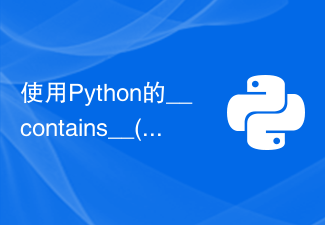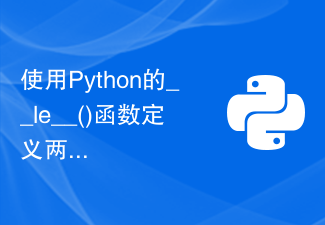Object-oriented advanced syntax part
By@staticmethod The decorator can turn the decorated method into a static method. What is a static method? In fact, it is not difficult to understand that ordinary methods can be called directly after instantiation, and instance variables or class variables can be called through self. in the method, but static methods cannot access instance variables or class variables, and one cannot access the instance. The methods of variables and class variables actually have nothing to do with the class itself. Its only connection with the class is that the method needs to be called through the class name.
class SchoolMember(object):
def __init__(self,name,age,sex):
self.name = name
self.age = age
self.sex = sex
member_nums = 0def introduce(self):
print("My name is %s,and I am %s year old." %(self.name,self.age))
@staticmethod
def talk():
print("I like to study python")class Teacher(SchoolMember):
def __init__(self,name,age,sex,course,salary):
super(Teacher,self).__init__(name,age,sex)
self.course = course
self.salary = salary
def Teaching(self):
print("Teacher %s is teaching %s." %(self.name,self.course))
s1 = Teacher("alex",22,"Femal","python",10000)
print("before:",s1.member_nums)
SchoolMember.member_nums = 12print("before:",s1.member_nums)
s1.member_nums = 666 #是在类中重新生成一个变量
print("after:",s1.member_nums)
SchoolMember.member_nums = 12print("after:",s1.member_nums)In the above code, member_nums is a class variable. If s1.member_nums is called directly, the value in the class is called; if s1.member_nums = 666, which is equivalent to adding a new variable to the instance. At this time, when modifying the value of the class, it will not affect the value of the variable in the instance. The output of the above code is as follows:
before: 0
before: 12
after: 666
after: 666
Static method of class @staticmethon:
SchoolMember(==== % % %= SchoolMember(,,
In the above code, if there is no @staticmethon, there will definitely be no problem in code execution, but when there is @staticmethod , the system prompts that one parameter is missing. If we turn a method into a static method, then this method has little to do with the instance.
class SchoolMember(object):
def __init__(self,name,age,sex):
self.name = name
self.age = age
self.sex = sex
member_nums = 0def introduce(self):
print("My name is %s,and I am %s year old." %(self.name,self.age))
@classmethod #类方法,不能访问实例变量
def talk(self):
print("%s like to study python" %SchoolMember.member_nums)
@staticmethod #让方法在类中剥离,与类没有关系,调用要传递参数
def walk(self):
print("%s is walking......" %self)
#SchoolMember.talk() #不能调用,类是没有办法访问实例变量,只能访问自己
s1 = SchoolMember("Alex",22,"Female") #实例化
s1.walk("alex")@staticmethod The static method is to make the method in the class not related to the class, and it can only be called by passing parameters when calling.
Class method
## Class method passes @classmethod Decorator implementation, the difference between class methods and ordinary methods is that class methods can only access class variables and cannot access instance variables
class SchoolMember(object):
def __init__(self,name,age,sex):
self.name = name
self.age = age
self.sex = sex
member_nums = 0def introduce(self):
print("My name is %s,and I am %s year old." %(self.name,self.age))
#@classmethod #类方法,不能访问实例变量
def talk(self):
print("%s like to study python" %self.name)
SchoolMember.member_nums
#SchoolMember.talk() #不能调用,类是没有办法访问实例变量,只能访问自己
s1 = SchoolMember("Alex",22,"Female") #实例化
s1.talk()
In the above code, (1) Classes cannot directly access the attributes in instances; (2)@classmethod is used to allow the program to only access variables in the class, such as SchoolMember.member_nums in the above code , this is a class method, we can access it in talk, but we cannot access self.name, because @classmethod can only access class attributes.
class SchoolMember(object):
def __init__(self,name,age,sex):
self.name = name
self.age = age
self.sex = sex
member_nums = 0def introduce(self):
print("My name is %s,and I am %s year old." %(self.name,self.age))
@classmethod #类方法,不能访问实例变量
def talk(self):
print("%s like to study python" %self.name)
SchoolMember.member_nums
#SchoolMember.talk() #不能调用,类是没有办法访问实例变量,只能访问自己
s1 = SchoolMember("Alex",22,"Female") #实例化
s1.talk()
运行结果如下:
Traceback (most recent call last):
File "/home/zhuzhu/day7/staticmethon方法.py", line 18, in <module>s1.talk()
File "/home/zhuzhu/day7/staticmethon方法.py", line 13, in talk
print("%s like to study python" %self.name)
AttributeError: type object 'SchoolMember' has no attribute 'name'</module>
As can be seen from the above, the above code @classmethon prohibits instance variables in the class. Only class variables can be used. That is, self.name, self.age and self.sex cannot be used, only variables of the self.nember_nums and SchoolMember.member_nums classes can be used. As follows:
class SchoolMember(object):
def __init__(self,name,age,sex):
self.name = name
self.age = age
self.sex = sex
member_nums = 0def introduce(self):
print("My name is %s,and I am %s year old." %(self.name,self.age))
@classmethod #类方法,不能访问实例变量
def talk(self):
print("%s like to study python" %SchoolMember.member_nums)
SchoolMember.member_nums
#SchoolMember.talk() #不能调用,类是没有办法访问实例变量,只能访问自己
s1 = SchoolMember("Alex",22,"Female") #实例化
s1.talk()
运行结果如下:0 like to study python
Attribute method
Attribute method The function is to turn a method into a static property through @property
SchoolMember(==== % % %= SchoolMember(,,
If @property is not added, the program can run normally, but @ is added After property, an error occurs when running the program. What is the reason? Because @property turns class methods into class attributes, when calling, we only need to execute s1.walk() without adding parentheses, as follows:
SchoolMember(==== % % %= SchoolMember(,,
In the above code, @property turns the class method into a member property. We can call it directly using s1.walk.
Classic vs. New Class
class A: #经典类的写法,新式类是A(object)尽量少用经典类,都用新式类现在
def __init__(self,name):
self.name = name
def f1(self):
print("f1,搞基")class B(A):
def __init__(self,name):
super(B,self).__init__(name)
# def f1(self):
# print("f1,来呀")class C(A):
def __init__(self,name):
super(C,self).__init__(name)
#def f1(self):
#print("f1,一起搞!")class D(B,C):
pass
d = D("Alex")
d.f1()
In the above code, class D inherits class B and class C. When we execute the method in class D, we first search in class B. This classic class and the new class The classes are all the same. If the search cannot be found, the classic class is searched in class A, while the new class is searched in class C. The example is as follows: (Note: The difference must be run in version 2.X. 3 . (New-style class) Execute the class of the same level first
(2) Classic class (execute the previous class first Level class)

The above is the detailed content of Object-oriented advanced. For more information, please follow other related articles on the PHP Chinese website!
 源码探秘:Python 中对象是如何被调用的?May 11, 2023 am 11:46 AM
源码探秘:Python 中对象是如何被调用的?May 11, 2023 am 11:46 AM楔子我们知道对象被创建,主要有两种方式,一种是通过Python/CAPI,另一种是通过调用类型对象。对于内置类型的实例对象而言,这两种方式都是支持的,比如列表,我们即可以通过[]创建,也可以通过list(),前者是Python/CAPI,后者是调用类型对象。但对于自定义类的实例对象而言,我们只能通过调用类型对象的方式来创建。而一个对象如果可以被调用,那么这个对象就是callable,否则就不是callable。而决定一个对象是不是callable,就取决于其对应的类型对象中是否定义了某个方法。如
 使用Python的__contains__()函数定义对象的包含操作Aug 22, 2023 pm 04:23 PM
使用Python的__contains__()函数定义对象的包含操作Aug 22, 2023 pm 04:23 PM使用Python的__contains__()函数定义对象的包含操作Python是一种简洁而强大的编程语言,提供了许多强大的功能来处理各种类型的数据。其中之一是通过定义__contains__()函数来实现对象的包含操作。本文将介绍如何使用__contains__()函数来定义对象的包含操作,并且给出一些示例代码。__contains__()函数是Pytho
 使用Python的__le__()函数定义两个对象的小于等于比较Aug 21, 2023 pm 09:29 PM
使用Python的__le__()函数定义两个对象的小于等于比较Aug 21, 2023 pm 09:29 PM标题:使用Python的__le__()函数定义两个对象的小于等于比较在Python中,我们可以通过使用特殊方法来定义对象之间的比较操作。其中之一就是__le__()函数,它用于定义小于等于比较。__le__()函数是Python中的一个魔法方法,并且是一种用于实现“小于等于”操作的特殊函数。当我们使用小于等于运算符(<=)比较两个对象时,Python
 详解Javascript对象的5种循环遍历方法Aug 04, 2022 pm 05:28 PM
详解Javascript对象的5种循环遍历方法Aug 04, 2022 pm 05:28 PMJavascript对象如何循环遍历?下面本篇文章给大家详细介绍5种JS对象遍历方法,并浅显对比一下这5种方法,希望对大家有所帮助!
 Python中如何使用getattr()函数获取对象的属性值Aug 22, 2023 pm 03:00 PM
Python中如何使用getattr()函数获取对象的属性值Aug 22, 2023 pm 03:00 PMPython中如何使用getattr()函数获取对象的属性值在Python编程中,我们经常会遇到需要获取对象属性值的情况。Python提供了一个内置函数getattr()来帮助我们实现这个目标。getattr()函数允许我们通过传递对象和属性名称作为参数来获取该对象的属性值。本文将详细介绍getattr()函数的用法,并提供实际的代码示例,以便更好地理解。g
 PHP编程进阶:多篇文章点赞功能设计与实现Feb 28, 2024 am 08:03 AM
PHP编程进阶:多篇文章点赞功能设计与实现Feb 28, 2024 am 08:03 AM作为一名PHP开发者,我们经常会遇到需要为网站或者应用添加点赞功能的需求。本文将介绍如何通过PHP编程进阶来设计和实现一个多篇文章点赞功能,以及提供具体的代码示例。一、功能需求分析在设计多篇文章点赞功能之前,首先需要明确我们的功能需求:用户可以查看网站上的多篇文章,并对每篇文章进行点赞操作。用户只能对每篇文章进行一次点赞,当用户已经点赞过时,不能重复点赞。用
 使用Python的isinstance()函数判断对象是否属于某个类Aug 22, 2023 am 11:52 AM
使用Python的isinstance()函数判断对象是否属于某个类Aug 22, 2023 am 11:52 AM使用Python的isinstance()函数判断对象是否属于某个类在Python中,我们经常需要判断一个对象是否属于某个特定的类。为了方便地进行类别判断,Python提供了一个内置函数isinstance()。本文将介绍isinstance()函数的用法,并提供代码示例。isinstance()函数可以判断一个对象是否属于指定的类或类的派生类。它的语法如下
 Go语言爬虫开发的高级技巧:深入应用Jan 30, 2024 am 09:36 AM
Go语言爬虫开发的高级技巧:深入应用Jan 30, 2024 am 09:36 AM高级技巧:掌握Go语言在爬虫开发中的进阶应用引言:随着互联网的迅速发展,网页上的信息量日益庞大。而获取网页中的有用信息,就需要使用爬虫。Go语言作为一门高效、简洁的编程语言,在爬虫开发中广受欢迎。本文将介绍Go语言在爬虫开发中的一些高级技巧,并提供具体的代码示例。一、并发请求在进行爬虫开发时,我们经常需要同时请求多个页面,以提高数据的获取效率。Go语言中提供


Hot AI Tools

Undresser.AI Undress
AI-powered app for creating realistic nude photos

AI Clothes Remover
Online AI tool for removing clothes from photos.

Undress AI Tool
Undress images for free

Clothoff.io
AI clothes remover

AI Hentai Generator
Generate AI Hentai for free.

Hot Article

Hot Tools

SublimeText3 Chinese version
Chinese version, very easy to use

Dreamweaver Mac version
Visual web development tools

WebStorm Mac version
Useful JavaScript development tools

Notepad++7.3.1
Easy-to-use and free code editor

SecLists
SecLists is the ultimate security tester's companion. It is a collection of various types of lists that are frequently used during security assessments, all in one place. SecLists helps make security testing more efficient and productive by conveniently providing all the lists a security tester might need. List types include usernames, passwords, URLs, fuzzing payloads, sensitive data patterns, web shells, and more. The tester can simply pull this repository onto a new test machine and he will have access to every type of list he needs.






